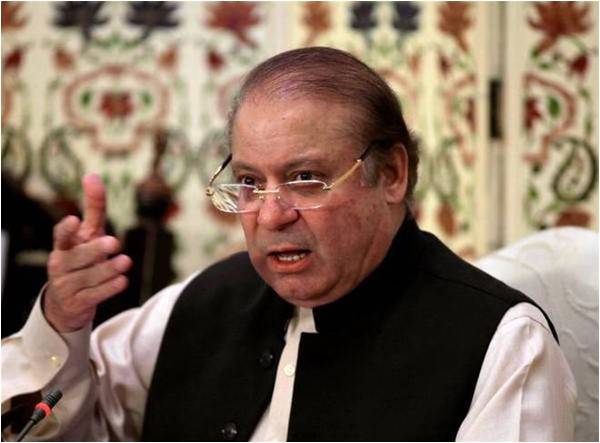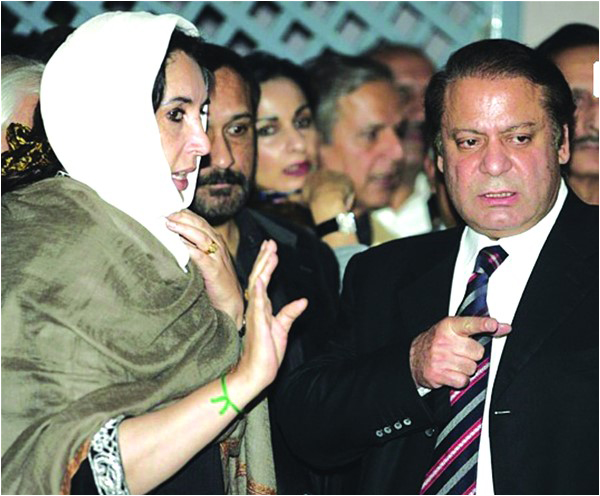
The post-disqualification return of Nawaz Sharif as head of his own faction of the Pakistan Muslim League is as dramatic as the hostile takeover he spearheaded some three decades ago. In 1988, people saw Muslim Leaguers throwing punches and chairs at each other at a luxury hotel in Islamabad. The end-game was the retreat of Muhammad Khan Junejo and the rise of Nawaz Sharif as party head. Back then Afghan Jihad was still alive and popular. The wave of extremism and terrorism had yet to submerge Pakistani society. And very few people had heard of Hafiz Saeed and Masood Azhar.
In July this year, the Supreme Court disqualified Nawaz Sharif before he could realize his dream of completing his constitutional tenure as prime minister. As interpreted under the Political Parties Order (2002), the decision also barred him from heading his political party. The Order set the criterion that a person could only head a political party if he or she was eligible to become an MNA. In its Panama Case verdict, the apex court thus disqualified Nawaz Sharif from becoming an MNA or holding any public office for life. So apparently, the party was also over for him.
The ordinance, introduced by General Musharraf before the 2002 general elections, was aimed at restricting both Nawaz Sharif and Benazir Bhutto from leading their political parties because both were convicted by the then “kangaroo courts”. The law further elaborated that any political party to be headed by an ineligible person would stand disqualified. In order to contest the elections, the PML-N chose to elect Javed Hashmi as its makeshift president, while the Pakistan People’s Party created a parallel set-up under the name of PPP-Parliamentarians, headed by Makhdoom Amin Fahim.
Behind the scenes
But then, last week, the National Assembly passed the Election Reforms Bill 2017 which has a clause that allows a person who has been disqualified from becoming a parliamentarian, to hold office of a political party.
Sources told TFT that Nawaz Sharif’s legal advisors, including Barrister Zafarullah Khan and Zahid Hamid, had suggested amending the Political Parties Order. The amendment they proposed would enable a disqualified person to head a political party. Though it was Sharif-specific, interestingly, it went unnoticed during the entire debating process at the Standing Committee level. It was Barrister Aitzaz Ahsan, a PPP senator, who detected what the PML-N legal team was up to. He and a few other senators protested, yet with what was almost like a swing of a magic wand, the ruling party had the bill passed from the Senate with a margin of just one vote.
Now the Pakistan Tehreek-e-Insaaf is calling for an explanation from their senators who refrained from voting and the Muttahida Qaumi Movement has sent a show-cause notice to its Senator Mian Attique for voting in favour of the bill. The PPP has not yet explained why a couple of its senators abstained from voting while sitting in the lobby.
The bill has now become a law. It can now either be repealed by Parliament with a simple majority or struck down by the Supreme Court.

Looking forward
The rumours mill in Islamabad is grinding out all sorts of information or misinformation about what really forced Nawaz Sharif to go down this road.
Given their track record, Muslim Leaguers are notorious for changing loyalties for the highest bidders. Under the given circumstances, Nawaz Sharif was certainly not the highest bidder. However, with his re-election as party president, he may stem the expected exodus of migratory birds until the next general elections, due in less than a year.
PTI leader Shah Mehmood Qureshi tried to create a wedge between Nawaz Sharif and his younger brother Shahbaz Sharif by asking if the younger Sharif wasn’t capable of leading the party.
Now a legal battle is about to begin. A few petitions have already been moved in the Supreme Court and the Lahore High Court, seeking a nullification of the controversial bill.
The PTI, Jamaat-e-Islami and Sheikh Rashid Ahmed are in synch about frustrating Nawaz Sharif’s desperate efforts to stay politically relevant as best as he can.
One of the most dangerous aspects of the entire controversy was a misuse of the same law by extremist elements. In a recent by-election in NA-120 Lahore, the Jamaat-ud-Dawa tried to contest the election under its political wing called the Milli Muslim League. After the Election Commission of Pakistan’s refused to register it as a political party, the JuD-backed candidate contested the election in an independent candidate and still managed to bag around 6,000 votes.
“Anyone who is ineligible to become a Member of the National Assembly can now head a political party. And, of course, it applies to people like Hafiz Saeed,” remarked senior lawyer Syed Zafar Ali Shah. He said people such as Hafiz Saeed or Masood Azhar who are under the Fourth Schedule would also be able to lead a political party. “In simple words the (fourth) schedule is a list of those individuals who are identified as proscribed persons, but have not been convicted by any court of law. They are publically known for their terror or extremist activities.”
Lawyer Hamid Khan believed the apex court would strike down the controversial bill. “Nawaz Sharif cannot enjoy being president of the PML-N for too long,” he predicted.
However, lawyer SM Zafar had a somewhat different opinion to share. He said the law did not violate basic human rights of any individuals. “Hence, the Supreme Court is unlikely to give its ruling against it.”
In July this year, the Supreme Court disqualified Nawaz Sharif before he could realize his dream of completing his constitutional tenure as prime minister. As interpreted under the Political Parties Order (2002), the decision also barred him from heading his political party. The Order set the criterion that a person could only head a political party if he or she was eligible to become an MNA. In its Panama Case verdict, the apex court thus disqualified Nawaz Sharif from becoming an MNA or holding any public office for life. So apparently, the party was also over for him.
In July this year, the Supreme Court disqualified Nawaz Sharif before he could realize his dream of completing his constitutional tenure as prime minister. As interpreted under the Political Parties Order (2002), the decision also barred him from heading his political party
The ordinance, introduced by General Musharraf before the 2002 general elections, was aimed at restricting both Nawaz Sharif and Benazir Bhutto from leading their political parties because both were convicted by the then “kangaroo courts”. The law further elaborated that any political party to be headed by an ineligible person would stand disqualified. In order to contest the elections, the PML-N chose to elect Javed Hashmi as its makeshift president, while the Pakistan People’s Party created a parallel set-up under the name of PPP-Parliamentarians, headed by Makhdoom Amin Fahim.
Behind the scenes
But then, last week, the National Assembly passed the Election Reforms Bill 2017 which has a clause that allows a person who has been disqualified from becoming a parliamentarian, to hold office of a political party.
Sources told TFT that Nawaz Sharif’s legal advisors, including Barrister Zafarullah Khan and Zahid Hamid, had suggested amending the Political Parties Order. The amendment they proposed would enable a disqualified person to head a political party. Though it was Sharif-specific, interestingly, it went unnoticed during the entire debating process at the Standing Committee level. It was Barrister Aitzaz Ahsan, a PPP senator, who detected what the PML-N legal team was up to. He and a few other senators protested, yet with what was almost like a swing of a magic wand, the ruling party had the bill passed from the Senate with a margin of just one vote.
Now the Pakistan Tehreek-e-Insaaf is calling for an explanation from their senators who refrained from voting and the Muttahida Qaumi Movement has sent a show-cause notice to its Senator Mian Attique for voting in favour of the bill. The PPP has not yet explained why a couple of its senators abstained from voting while sitting in the lobby.
The bill has now become a law. It can now either be repealed by Parliament with a simple majority or struck down by the Supreme Court.

Looking forward
The rumours mill in Islamabad is grinding out all sorts of information or misinformation about what really forced Nawaz Sharif to go down this road.
Given their track record, Muslim Leaguers are notorious for changing loyalties for the highest bidders. Under the given circumstances, Nawaz Sharif was certainly not the highest bidder. However, with his re-election as party president, he may stem the expected exodus of migratory birds until the next general elections, due in less than a year.
PTI leader Shah Mehmood Qureshi tried to create a wedge between Nawaz Sharif and his younger brother Shahbaz Sharif by asking if the younger Sharif wasn’t capable of leading the party.
Now a legal battle is about to begin. A few petitions have already been moved in the Supreme Court and the Lahore High Court, seeking a nullification of the controversial bill.
The PTI, Jamaat-e-Islami and Sheikh Rashid Ahmed are in synch about frustrating Nawaz Sharif’s desperate efforts to stay politically relevant as best as he can.
The ordinance, introduced by General Musharraf before the 2002 general elections, was aimed at restricting both Nawaz Sharif and Benazir Bhutto from leading their political parties because both were convicted by the then "kangaroo courts"
One of the most dangerous aspects of the entire controversy was a misuse of the same law by extremist elements. In a recent by-election in NA-120 Lahore, the Jamaat-ud-Dawa tried to contest the election under its political wing called the Milli Muslim League. After the Election Commission of Pakistan’s refused to register it as a political party, the JuD-backed candidate contested the election in an independent candidate and still managed to bag around 6,000 votes.
“Anyone who is ineligible to become a Member of the National Assembly can now head a political party. And, of course, it applies to people like Hafiz Saeed,” remarked senior lawyer Syed Zafar Ali Shah. He said people such as Hafiz Saeed or Masood Azhar who are under the Fourth Schedule would also be able to lead a political party. “In simple words the (fourth) schedule is a list of those individuals who are identified as proscribed persons, but have not been convicted by any court of law. They are publically known for their terror or extremist activities.”
Lawyer Hamid Khan believed the apex court would strike down the controversial bill. “Nawaz Sharif cannot enjoy being president of the PML-N for too long,” he predicted.
However, lawyer SM Zafar had a somewhat different opinion to share. He said the law did not violate basic human rights of any individuals. “Hence, the Supreme Court is unlikely to give its ruling against it.”

